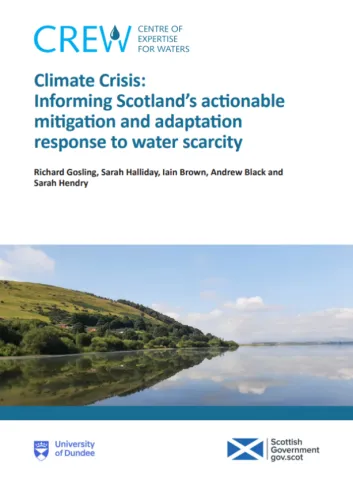
Water scarcity occurs when access to sufficient water, both in quantity and quality, becomes limited. This can happen due to increased demand or reduced supply, such as during more frequent and severe droughts. Scotland’s climate is changing at an unprecedented rate, exposing the country to climate-related risks that were previously deemed insignificant.
As we better understand the increasing severity and frequency of dry periods and our potential future demands on our water supply, an adaption gap has become evident. This gap risks the security of what has been seen as a dependable, high-quality water supply. The impacts of water scarcity are already evident, with some local authorities, such as Aberdeenshire, having to deliver bottled water to homes with dry private supplies and farmers facing restrictions on irrigation.
This project, led by experts at the University of Dundee, sought to address current knowledge on water scarcity in Scotland, current strategies to mitigate water scarcity, future readiness in the face of climate uncertainty, which adaptive strategies are required to mitigate water scarcity and how these strategies can be integrated within Scotland’s existing policy framework. The research revealed several concerning trends and future projections. Scotland’s natural water supply is becoming more variable. Both meteorological and hydrological droughts have increased in frequency. Climate change projections suggest that drought conditions in Scotland will become more severe, more frequent and more prolonged over the next few decades. Future water demand is likely to increase, especially in areas and times of the year when water supply is projected to decrease. Responses to extreme weather events may exacerbate this issue if not managed properly.
There is a consensus among water sector participants in this project that water scarcity in Scotland is generally underestimated and that water resources are undervalued. There’s a common misconception that water resources are abundant in Scotland due to the perception that it’s ‘always raining’.
Currently, various strategies are in place to mitigate water scarcity, but their future effectiveness under changing climate conditions remains uncertain. The project highlights the need for comprehensive and flexible strategies to ensure water security. It proposed various strategies such as enhanced monitoring of water resources, implementation of water-saving technologies, educating the public on responsible water usage and ensuring new policies align and integrate with those that already exist.
Addressing water scarcity in Scotland requires a concerted effort from all sectors of society. By integrating robust monitoring, adaptive management practices, and public awareness, Scotland can better prepare for the water challenges posed by climate change. This research underscores the need to act now to protect Scotland's precious water resources, ensuring they remain available for future generations. With the right strategies and a commitment to sustainable water management, Scotland can navigate these challenges and safeguard its natural heritage.